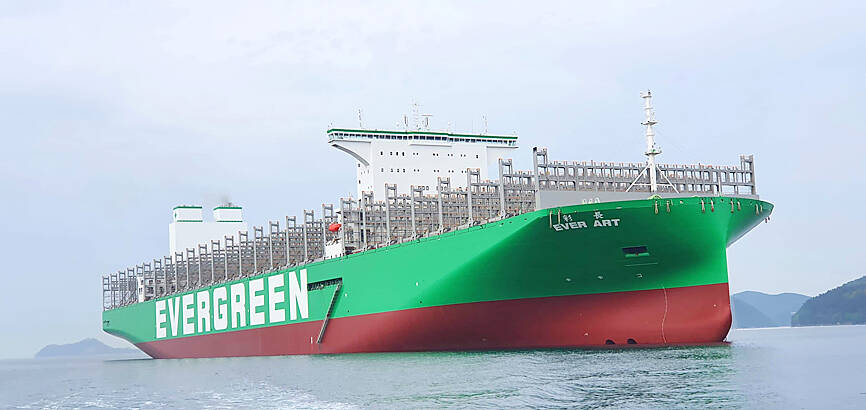Evergreen Marine Corp (長榮海運) yesterday said that although the first quarter was bad, it remained “cautious, but not pessimistic” about this year, expecting inventory digestion to help improve its cargo shipping business in the second half.
Revenue at the nation’s largest container shipper fell 61 percent annually to NT$66.8 billion (US$2.19 billion) in the first quarter after shipping rates plunged 66 percent year-on-year to US$1,031 per twenty-foot equivalent unit (TEU) from US$3,060 per TEU, company data showed.
Freight volume in the first quarter did not plunge as much, with Evergreen Marine reporting 1.84 million TEUs, down 2.6 percent from 1.89 million TEUs a year earlier.

Photo courtesy of Evergreen Marine Corp
“Overall, global players all saw their income contract by 60 percent year-on-year in the first quarter, as shipping rates fell due to inflation and high inventory,” Evergreen Marine president Eric Hsieh (謝惠全) told an investors’ conference in Taipei.
However, Evergreen Marine is not pessimistic, as the first quarter is usually the slowest of the year, Hsieh said, adding that its revenue in the first quarter was still higher than in 2018 and 2019 before the COVID-19 pandemic.
Evergreen expects shipping rates and demand to begin rebounding at the end of June, as downside factors such as inflation, interest rate hikes and inventory woes should soften, Hsieh added.
Business should recover from the third quarter, he said.
“During the past few quarters, we witnessed containers being used as warehouses due to high inventory, but recently the turnover of containers has accelerated, indicating that inventory digestion was smooth,” he said.
As prices for fuel have calmed, manufacturing in Europe should recover, as it would in China after it ended pandemic lockdowns, Hsieh said.
“However, as many suppliers have moved production from China to Southeast Asia since the COVID-19 pandemic began, we have also observed that imports from Southeast Asia to the US are increasing, while those from China are decreasing,” he said.
Given that shipping rates are comparatively low, the shipper would not rush to sign new long-term contracts, he added.
On the other hand, tighter environmental requirements on vessels should also curb capacity, a trend that would help to solidify shipping rates, he said.

Taiwan Semiconductor Manufacturing Co (TSMC, 台積電) yesterday said that its investment plan in Arizona is going according to schedule, following a local media report claiming that the company is planning to break ground on its third wafer fab in the US in June. In a statement, TSMC said it does not comment on market speculation, but that its investments in Arizona are proceeding well. TSMC is investing more than US$65 billion in Arizona to build three advanced wafer fabs. The first one has started production using the 4-nanometer (nm) process, while the second one would start mass production using the

‘SILVER LINING’: Although the news caused TSMC to fall on the local market, an analyst said that as tariffs are not set to go into effect until April, there is still time for negotiations US President Donald Trump on Tuesday said that he would likely impose tariffs on semiconductor, automobile and pharmaceutical imports of about 25 percent, with an announcement coming as soon as April 2 in a move that would represent a dramatic widening of the US leader’s trade war. “I probably will tell you that on April 2, but it’ll be in the neighborhood of 25 percent,” Trump told reporters at his Mar-a-Lago club when asked about his plan for auto tariffs. Asked about similar levies on pharmaceutical drugs and semiconductors, the president said that “it’ll be 25 percent and higher, and it’ll

When an apartment comes up for rent in Germany’s big cities, hundreds of prospective tenants often queue down the street to view it, but the acute shortage of affordable housing is getting scant attention ahead of today’s snap general election. “Housing is one of the main problems for people, but nobody talks about it, nobody takes it seriously,” said Andreas Ibel, president of Build Europe, an association representing housing developers. Migration and the sluggish economy top the list of voters’ concerns, but analysts say housing policy fails to break through as returns on investment take time to register, making the

CHIP BOOM: Revenue for the semiconductor industry is set to reach US$1 trillion by 2032, opening up opportunities for the chip pacakging and testing company, it said ASE Technology Holding Co (日月光投控), the world’s largest provider of outsourced semiconductor assembly and test (OSAT) services, yesterday launched a new advanced manufacturing facility in Penang, Malaysia, aiming to meet growing demand for emerging technologies such as generative artificial intelligence (AI) applications. The US$300 million facility is a critical step in expanding ASE’s global footprint, offering an alternative for customers from the US, Europe, Japan, South Korea and China to assemble and test chips outside of Taiwan amid efforts to diversify supply chains. The plant, the company’s fifth in Malaysia, is part of a strategic expansion plan that would more than triple